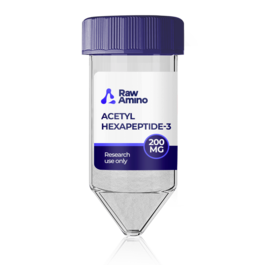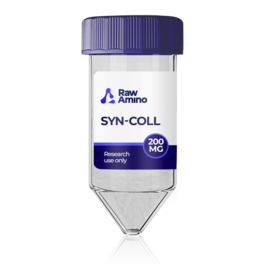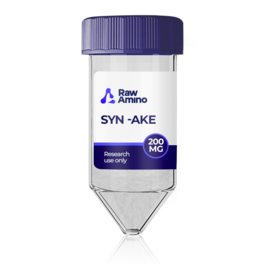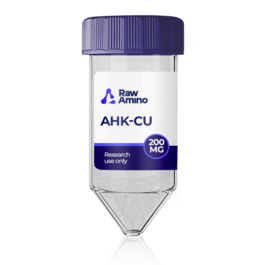
Decapeptide-12 – 200MG
$221.00
Discount per Quantity
| Quantity | Discount | Price |
|---|---|---|
| 5 - 8 | 5% | $209.95 |
| 9 + | 10% | $198.90 |
Scientific Overview of Decapeptide-12
Decapeptide-12 is a synthetic oligopeptide composed of twelve amino acids. It has been investigated for its potential to interact with tyrosinase, an enzyme commonly associated with melanin biosynthesis. Researchers suggest this interaction may influence pigmentation processes in epidermal tissues.
Decapeptide-12 Studies and Research Data
Research on Epidermal Cell Metabolism
One investigation explored how Decapeptide-12 may influence the expression of sirtuin genes in keratinocyte progenitors. These genes are involved in pathways related to metabolism, DNA repair, and stress responses. Findings suggested that the peptide might modulate transcription levels of SIRT1, SIRT3, SIRT6, and SIRT7, which could potentially be linked to oxidative stress resistance, mitochondrial activity, genomic stability, and cellular maintenance.
Research on Epidermal Tissue Hyperpigmentation
In research models of melasma and solar lentigines, Decapeptide-12 has been studied for its possible role in reducing hyperpigmentation. Reports indicate that some models exhibited changes in pigmentation patterns, with a proportion demonstrating reduced severity of photodamage over time. Additional studies suggested potential benefits in addressing post-inflammatory pigmentation and more persistent pigmentation types.
Decapeptide-12 Research on Epidermal Layer Penetration
Due to its lyophobic structure, Decapeptide-12 has been examined for modifications that may enhance its permeability through epidermal tissue. One approach involved linking a palmitate chain to improve lipophilicity, with docking studies suggesting that the modified peptide may retain its interaction with tyrosinase while displaying greater permeability.
Decapeptide-12 Research on Tyrosinase Interaction
Tyrosinase plays a central role in the early stages of melanin production. Laboratory studies suggest that Decapeptide-12 may interact with the enzyme or its gene expression, potentially reducing its catalytic activity. While precise mechanisms are not fully understood, theories include binding to structural regions of tyrosinase or influencing transcription pathways.
Conclusion
Research surrounding Decapeptide-12 focuses primarily on its relationship to pigmentation pathways, tyrosinase interaction, and cellular responses in epidermal models. Findings to date suggest possible implications for pigment regulation, cell metabolism, and penetration strategies, although mechanisms remain under investigation and require further exploration.
References
- Hantash, B. M., & Jimenez, F. (2009). A split-face, double-blind, randomized, and placebo-controlled pilot evaluation of a novel oligopeptide for the treatment of recalcitrant melasma. Journal of drugs in dermatology: JDD, 8(8), 732–735.
- Basil, M. H., & Anan, A. U. (2019). Tyrosinase inhibitors with potent anti-senescence activity in human neonatal keratinocyte progenitors. J Dermatol Surg Res Ther, 2019, 30-39.
- Hantash, B. M., & Jimenez, F. (2012). Treatment of mild to moderate facial melasma with the Lumixyl topical brightening system. Journal of drugs in dermatology: JDD, 11(5), 660–662.
- Jiang L, Hino PD, Bhatia A, Stephens TJ, Jimenez F. Efficacy of Trifecting® Night Cream, a Novel Triple acting Skin Brightening Product: A Double-blind, Placebo-controlled Clinical Study. J Clin Aesthet Dermatol. 2018 Dec;11(12):21-25.
- Kassim AT, Hussain M, Goldberg DJ. Open-label evaluation of the skin-brightening efficacy of a skin-brightening system using decapeptide-12. J Cosmet Laser Ther. 2012 Apr;14(2):117-21.
- Ramírez SP, Carvajal AC, Salazar JC, Arroyave G, Flórez AM, Echeverry HF. Open-label evaluation of a novel skin brightening system containing 0.01% decapeptide-12 in combination with 20% buffered glycolic acid. J Drugs Dermatol. 2013 Jun 1;12(6):e106-10.
- Bhatia, A., Hsu, J. T.s, & Hantash, B. M. (2014). Combined topical delivery and dermalinfusion of decapeptide-12 accelerates resolution of post-inflammatory hyperpigmentation in skin of color. Journal of drugs in dermatology: JDD, 13(1), 84–85.
- Chen J, Bian J, Hantash BM, Albakr L, Hibbs DE, Xiang X, Xie P, Wu C, Kang L. Enhanced skin retention and permeation of a novel peptide via structural modification, chemical enhancement, and microneedles. Int J Pharm. 2021 Sep 5;606:120868.
Disclaimer:
The products mentioned are intended solely for laboratory research and in-vitro experimentation. They are not approved for human or animal use of any kind. All details provided are for educational purposes only. By purchasing from this site, you agree to comply with our Terms and Conditions.
10 reviews for Decapeptide-12 – 200MG
Only logged in customers may leave a review.




Karen1501 –
vial81 –
Confidence boosted by the reporting and analysis data, thx
Silver Raven –
everything was smooth from start to finish
anthony_harris –
Orders came in without a hitch. strong stuff. Easy process.
david72 –
excellent quality and fast shipping. easy to order, shipped quickly 👍
williamsmichael –
Every delivery from Raw Amino has matched the quality specifications promised. The consistency of the product across batches is critical, and I’ve never noticed variation between lots. That reliability saves time and builds trust.
DouglasC23 –
Customer support was quick to respond to a late-night email, which surprised me. The staff explained everything clearly, followed up the next day, and even provided additional documentation I didn’t request. That level of support is rare and appreciated.
Teresa X. –
EVERYTHING ARRIVED IN PERFECT CONDITION.
ion804z –
Excellent quality and fast shipping. Reliable and trustworthy every order. Very consistent and reliable results. Purity levels are outstanding.
Nicole504 –
Awesome! 10/10